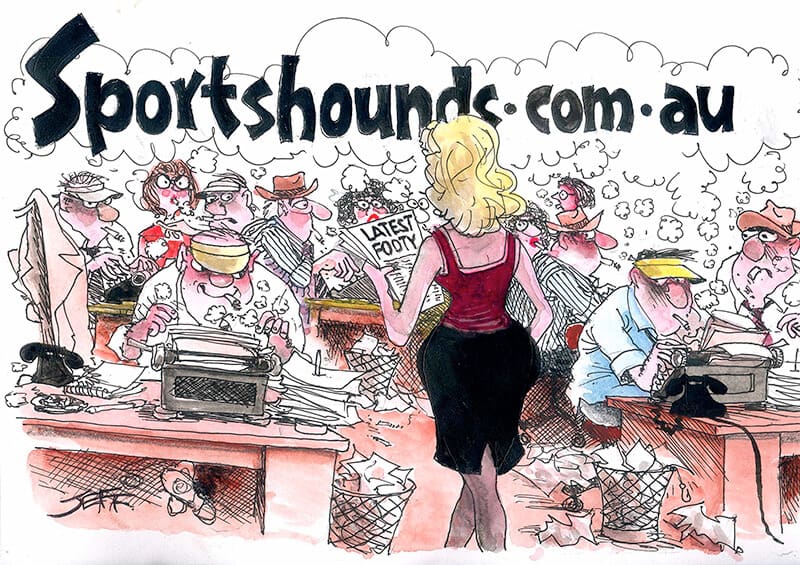ROD NICHOLSON tries to steer a path towards peace in the increasingly bitter cricket pay dispute:
CRICKET AUSTRALIA chief executive James Sutherland is likely to be the biggest loser in the bitter public spat between CA and the Australian Cricketers Association.
Why? Because the man who has been party to the four previous revenue share deals with the players seems torn between serving the wishes of the Board and preserving the system he has helped orchestrate to reward the players.
He is in a no-win situation: and that, perhaps, is why he has not fronted the negotiations.
CA is determined to end the 25 per cent revenue share for players, a system that began in 1997 when a young accountant Sutherland provided the sums to allow Bob Merriman, Denis Rogers, Malcolm Gray and then chief executive Malcolm Speed to present players with a 25 per cent share of cricket’s revenue _ at that stage, $57 million a year.
Sutherland subsequently negotiated with Tim May and Ian Healy, then the ACA’s Paul Marsh.
During that period cricket’s revenue rose to more than $400 million, but common sense prevailed. Players conceded the sale of property or major events for sponsors had nothing to do with them, and the 25 per cent of all revenue dwindled to 25 per cent of about 73 per cent of all revenue.
But when the players were slicing a pie the size of $400-plus million, there were no complaints on either side.
What appears to be happening now is CA’s desire to dismantle the players union and seek individual contracts. Make no mistake, the deals are generous for individuals, for example, with female cricketers reported to be looking at a 166 per cent increase over the next five years.
However, that may well be the sticking point for Sutherland, who last weekend was in the UK on official duties when the ACA’s contracts lapsed, putting 230 cricketers on the unemployed list, a tour of South Africa scrapped, and threats of strike action for the important tour of India.
One must wonder if Sutherland is torn on this issue. He has an obligation to push CA’s new payment methodology but on the other he may not see the need to end the share revenue deal. If that’s the case, he can’t win regardless of the outcome.
The brinkmanship in this spat is serious. The ACA is solid. Individuals who stand to enjoy major boosts to their personal income have rejected the individual contracts in favour of “sticking with the team” on the revenue sharing system.
Whereas in the past Sutherland has been able to successfully negotiate with the players (excluding specific income streams against an ever-increasing revenue base), he has not been involved this time, despite being the chief executive of CA.
Maybe he could sort it all out by suggesting cost cutting of overall revenue, while maintaining the current revenue share ratio.
He would have genuine grounds.
When the system began, the Australian team had one coach (now five), one physiotherapist (now half a dozen), no doctor, no first-class travel, no wives on tour payments, no one-player-to-a-room policy, and no computer expert while now there are five. The players benefit from all such costs, but don’t contribute. It could be a good trade-off argument if CA agrees to retain the revenue share method.
As it is, the only feasible outcome (bar Sutherland getting his hands dirty in this debate) is for the ACA to go to the Fair Work Commission. They have one of the best in the business to instigate that _ Greg Combet, the face of the union movement during the 1998 waterfront dispute as well as former federal Labor minister and ACTU boss.
That, unfortunately for both sides, would air the “dirty linen” with all the multi-million-dollar deals, sensitive commercial contracts and staggering player incomes being revealed.
However, if mediation doesn’t work, at least the Fair Work Commission can make a binding decision on both parties.
Better still if Sutherland were to front up. At present the players have Combet, and CA its chairman, former Rio Tinto boss David Peever, calling the shots along with general manager Kevin Roberts, but Sutherland is the face of CA, the man the public and the players know.
If he doesn’t take this issue by the scruff of the neck and sort it out, he may well be the one unemployed at the end of the day.
ROD NICHOLSON is one of Australia’s best-known sports journalists. He reported cricket, football, racing and other sports for 47 years for The Herald and The Herald Sun.



Discussion about this post